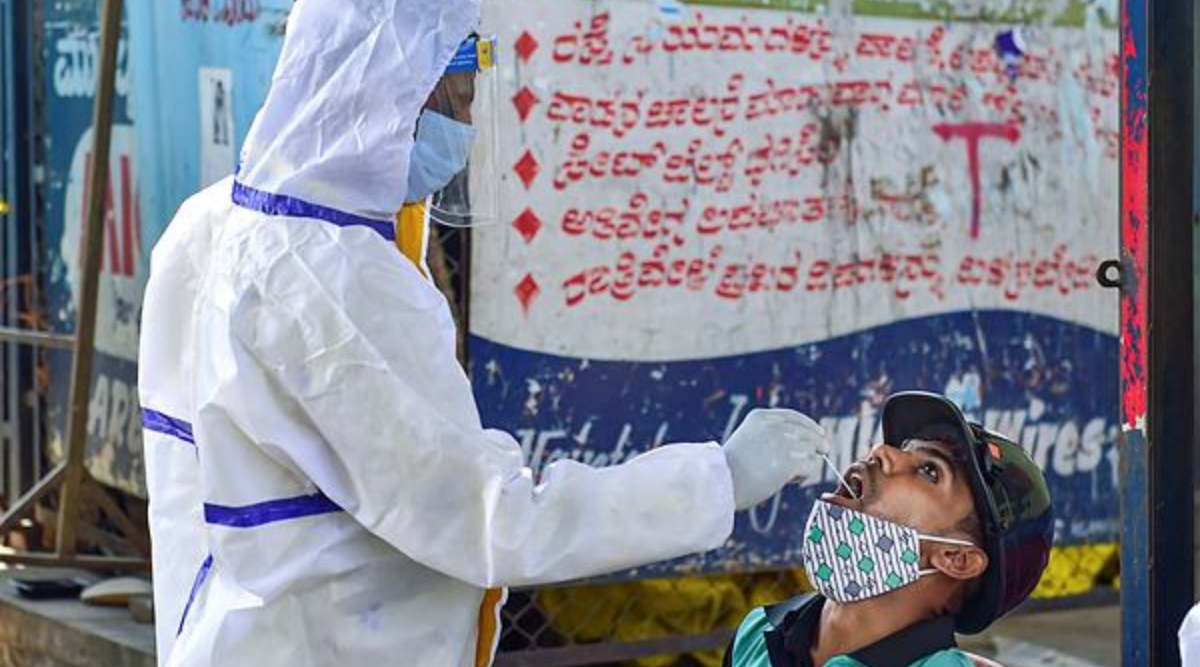 A health worker collects swab sample from a person for COVID-19 test, at a market in Bengaluru. (PTI Photo)
A health worker collects swab sample from a person for COVID-19 test, at a market in Bengaluru. (PTI Photo) TO COMPLEMENT the national effort led by Indian SARS-CoV-2 Consortium on Genomics (INSACOG), a consortium of four city clusters – Bengaluru, Hyderabad, New Delhi and Pune – has been established to upscale genomic surveillance on SARS-CoV-2, the virus that causes Covid-19. The new effort aims at developing strategies and building capabilities to identify variants of concern before they spread widely and cause outbreaks, said experts.
The consortium aims to develop targeted sampling strategies based on granular epidemiological and clinical data. Coupled with intense environmental surveillance and advanced computational techniques, the consortium will also focus on building capabilities for real-time surveillance and epidemiology, read an official statement issued on Thursday.
The consortium has been established with the support and seed funding of Rockefeller Foundation, and is led by CSIR-Centre for Cellular and Molecular Biology (CCMB), Hyderabad. At present, it includes different partners in three other cities: NCBS-TIFR, InStem-DBT and NIMHANS in Bengaluru; CSIR-IGIB in New Delhi; Pune Knowledge Cluster, CSIR-NCL and IISER in Pune. It will work closely with local governments, hospitals and clinicians. In collaboration with INSACOG, the consortium aims to eventually turn this into a national effort by expanding to other strategic locations in India.
Dr Rakesh Mishra, adviser at CSIR-CCMB, will lead these efforts along with Prof Satyajit Mayor, NCBS; Prof L S Shashidhara, Pune Knowledge Cluster; and Dr Anurag Agrawal, CSIR-IGIB.
Team members said, “Our aim is to develop strategies and capabilities to identify variants of concern before they spread widely and cause outbreaks. This will also help correlate with clinical symptoms and disease severity, potentially associated with emerging variants.”
Dr Vinay Nandicoori, director, CSIR-CCMB, said, “All partner institutes are fighting Covid-19 since its beginning. This much-needed collaboration will bring all their strengths together in a structured fashion.”
Pune Knowledge Cluster (PKC), along with its partners, is also involved in Covid-19 epidemiological and clinical data curation and analyses, sero survey, and in preparing a roadmap for the city’s preparedness for another wave, besides bringing economic and educational activity back to normal.
Viral genome surveillance, including environmental surveillance, will provide valuable information in framing better public health policies for Pune, which is one of the worst-hit cities in the world by the pandemic. While CSIR-NCL, IISER Pune, BJMC, Symbiosis, KEM and many partners will execute the work, PKC facilitates collaborations, permissions and funds, said Prof Shashidhara, one of the founders of PKC.
- The Indian Express website has been rated GREEN for its credibility and trustworthiness by Newsguard, a global service that rates news sources for their journalistic standards.

